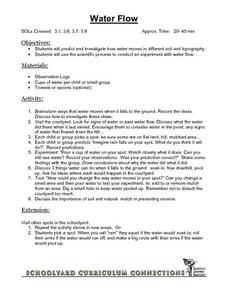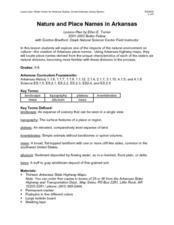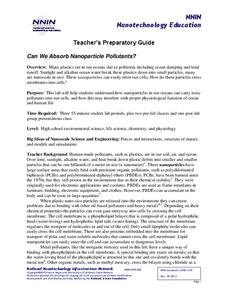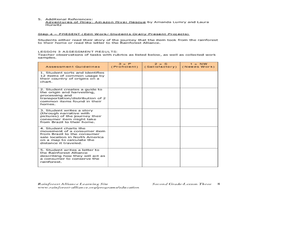Curated OER
Forests of the World
In this forests worksheet, learners read a one page informational excerpt on different forests throughout the world. They then use what they learned to answer the 20 questions on the worksheet. The answers are on the last page of the...
Curated OER
Acid Rain and pH
Students study acidic and alkaline balance. In this acid and pH levels lesson, students read information about pH, the formation of acid rain and its impact on environments. Students then complete an experiment to learn about the effects...
Curated OER
How Far Away is a Tropial Rainforest?
Students explore how far a rainforest is from their home. In this rainforest lesson students examine how far they live away from the rainforest. Students use the length of their school day to compare how long it will take to travel to...
Curated OER
Hands on Biome--Building
Students create a model biome. In this ecology activity, students use materials to create a model biome. There is an extension activity that allows students to write about plants and animals and their specific biome.
Curated OER
History of Natural Resources in the U.S.
Students define conservation, exploitation and preservation, identify legislation related to conservation and environmental issues, and identify leaders and organizations that were key to the conservation and environmental movements.
Curated OER
Workers on Sea and on Land
Students use photos of sailors and workers in the shipbuilding industry as a reference point to generate questions and investigate the working conditions for resource industry workers in 19th and 20th centruy Atlantic Canada and the...
Curated OER
Estuaries, Estuarine Habitats, and Adaptations
Middle schoolers conduct research on estuaries. They design and construct an estuary, describe the physical characteristics of an estuary, and create a diagram illustrating an estuarine food web.
Curated OER
Home: the Story of Maine "A Love for the Land": Where Are You? Who Are You?
Students investigate their neighborhood both as it is now and as it was 100 years ago. They take a walk around their neighborhood and fill out a worksheet before completing a worksheet.
Curated OER
Adaptations To the Environment
Pupils design and construct an imaginary animal that is perfectly adapted to a particular type of biome. They give the animal a scientific name, place it in a phylum and write descriptions about its behavior, reproduction, foraging,...
Curated OER
Environment: Methane Sources
Students discover how human activity is increasing the release of methane gas into the atmosphere. Woring in groups, they visit the Eduzone Website and complete worksheets. Students identify the natural and human causes of methane gas.
Curated OER
Environment: Water Flow
Students brainstorm the ways that water flows when it falls to the ground. After discussing three things water can do, they investigate and predict water movement outdoors on school grounds. They experiment ways to alter the water flow...
Curated OER
Nature and Place Names in Arkansas
Middle schoolers examine the way that many place names in Arkansas came to be. By looking at Arkansas highway maps, they find names that come from the characteristics of each of the state's six geographical divisions. This interesting...
American Institute of Architects
Architecture: It's Elementary!—Fifth Grade
Young citizens construct an understanding of urban planning in this cross-curricular unit. Covering every aspect of city development from the political, economic, and social influences to sustainable building practices, this 10-lesson...
National Nanotechnology Infrastructure Network
Can We Absorb Nanoparticle Pollutants?
Just because we can't see it doesn't mean it isn't there! A growing concern for environmental scientists is toxic nanoparticles in our air and water. Young scholars conduct an experiment to demonstrate how these particles can cross our...
Chicago Botanic Garden
Climate Change Impacts on Ecosystem Services
The fourth activity in a series of five has classes participate in a jigsaw to learn about global impacts of climate change and then share their new information with a home group. Groups then research impacts of climate change (droughts,...
Chicago Botanic Garden
Climate and Forest Ecosystem Services
Forests, through sequestration, capture excess carbon dioxide in our atmosphere and store it, aiding in climate change. The third installment in a four-part series on how climate impacts forests explores carbon sequestration. Classes...
Curated OER
Understanding Lava Layers
Seventh graders view "Volcano" by National Geographic Video. They experiment with baking soda and study lava flow. They describe volcano and earthquake patterns. They analyze weather and climate changes and how they relate to the natural...
Curated OER
How Smart Growth Can Reshape Communities
Middle schoolers explore the concept of smart growth development. They create a class list highlighting the benefits of smart growth and then research, discuss, and present their findings on the benefits of smart growth and how it...
Messenger Education
Exploring Exploring
The reason people first began trading was because of their desires for objects other societies possessed. In the activity, classes discuss why exploration has been a common thread in all societies and where these desires have taken...
American Museum of Natural History
What do You Know About Life on Earth?
Humans have only inhabited the earth for a fraction of the time that life has existed. Young scientists explore the facts about the emergence of life on Earth with an interactive resource. While highlighting different types of life, the...
Curated OER
What in Our World Affects the Way People Live
Sixth graders study various maps that show geographical features and population. They compare the maps and make inferences about how various geographical features influence the population and human activities of an area.
Curated OER
Fantasy / Art Maps
Ninth graders analyze a fantasy art map by Jeremy Anderson, paying careful attention to the way the topographic features of the land are represented. They create a similar map of Sacramento that includes topographical features as well as...
Curated OER
Products from the Rainforest
Second graders write a story about the journey a food has from the rainforest to your table. In this food lesson plan, 2nd graders research different foods and products that come from the rainforest and discover how it ended up in their...
Curated OER
Local Environmental Issues: Pollution
Third graders discuss the ways in which human interaction with the environment and production of waste products contribute to pollution. Through a pollution demonstration, they explain how various groups of plants and animals can be...

























